Tech
In a rural Kentucky community, the roar of a suspected crypto ‘mine’ never ends • Kentucky Lantern
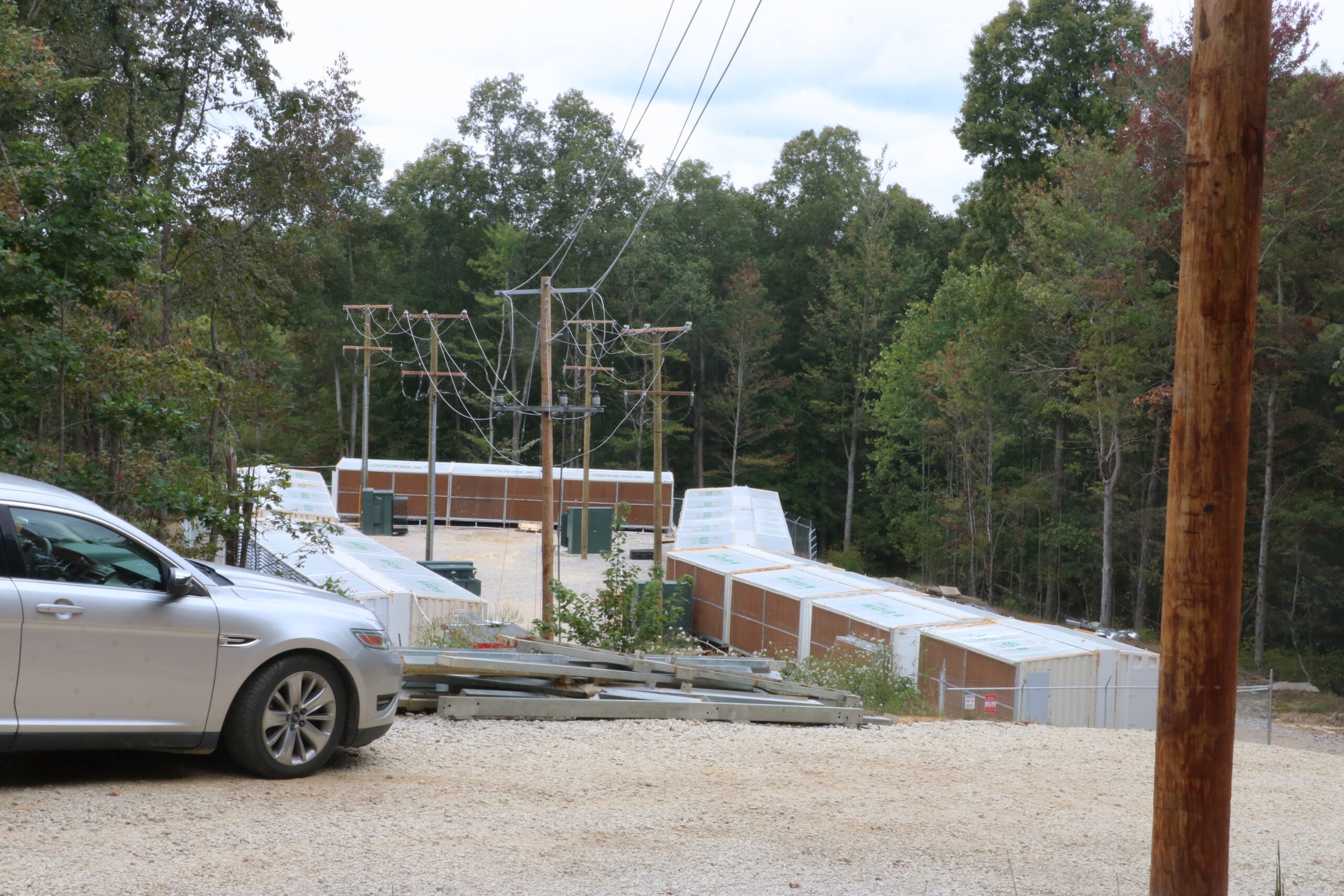
WOLFE COUNTY — She couldn’t see it through the trees on a recent late September morning, but she’s felt its presence for weeks on end.
Up the hill across from her home along the Wolfe-Lee county line, 76-year-old Brenda Campbell can hear through the leaves a constant, high-pitched whirring that rivals the cicada screeches in the Eastern Kentucky woods.
The noise, while not ear-piercingly loud at about 50 to 60 decibels, has been an aggravating, unabated problem for her and her neighbors who have generally enjoyed a quieter life in their rural community. Several of those neighbors are her family who have lived for generations in the area, less than a six mile drive from Natural Bridge State Resort Park.
“It’s all night long. It’s all day,” Campbell said, speaking with some of her family members and neighbors gathered on her driveway. “It has to be like brainwashing, you know, because it’s consistent. There’s no variation.”
Standing from left to right: Corey Mattingly, Brenda Campbell’s grandson; Brenda Campbell; Jerry Oliver; Myra Oliver, Campbell’s cousin; Terry Booth. (Kentucky Lantern photo by Liam Niemeyer)
In August, a Houston, Texas-based company Artemis Power Tech started operating a “data center” next to an electrical substation run by East Kentucky Power Cooperative, the utility serving Wolfe County and much of Eastern Kentucky.
In a shallow valley next to the substation, the data center looks like an active construction site with metal containers believed to be filled with high-powered computers — the whirring noise coming from fans working to keep the computers from overheating — sitting on a gravel bed.
While there’s uncertainty about what these computers are doing, Campbell and her family members suspect it’s a cryptocurrency mining operation, which typically uses immense amounts of electricity to run high-powered computers.
Computers involved with cryptocurrency mining solve complicated mathematical equations that help secure online transactions of the cryptocurrencies through a digital ledger called the “blockchain.” In the case of the popular cryptocurrency Bitcoin, mining companies are rewarded for solving the equations with Bitcoin itself; each Bitcoin is valued at more than $27,000 as of early October.
The money that’s made at the site has meant only metallic, unnatural noise in Campbell’s natural environment. The loud noise from a nearby ATV park is a headache for Campbell and her neighbors during the warmer months, but usually quiets down in the winter. Campbell worries the sound of this new operation will never pause, only worsening when the trees lose their leaves.
 Corey Mattingly, the grandson of Brenda Campbell, standing across the street from his apartment where the noise from Artemis Power Tech’s facility comes through the trees. (Kentucky Lantern photo by Liam Niemeyer)
Corey Mattingly, the grandson of Brenda Campbell, standing across the street from his apartment where the noise from Artemis Power Tech’s facility comes through the trees. (Kentucky Lantern photo by Liam Niemeyer)
Her grandson, Corey Mattingly, who lives across the street from her, has had to turn on a fan at night because the sound penetrates the walls of his apartment. Her daughter, Shannon Foster, has had trouble finding local owls since the operation fired up, and Campbell worries how the bird population has been affected. Embedded “in your brain after a while” is how one of Campbell’s neighbors, Terry Booth, described the noise.
Campbell in recent weeks has lobbied her local county judge-executive and magistrates to pass a noise ordinance specifically geared toward addressing sound from cryptocurrency mining operations. Rural communities in other states have complained about noise from cryptocurrency mining operations, but it’s new in Wolfe County.
As more of these operations pop up across Kentucky, some think cryptocurrency mining will bring economic development to communities that need it. Campbell is doing what she can to try to bring some of the quiet back to her home.
“It’s like we’ve been taken advantage of,” Campbell said. “Nobody really cared what we thought. It didn’t matter that our property value might be lessened because of the noise. That was not important.”
How a Houston company’s data center arrived in Wolfe County
Not only are Brenda Campbell and her neighbors exasperated by the noise, they also feel blindsided by what little notice they received that the facility was coming into their community.
Wolfe County, like many rural counties in Kentucky, has no zoning laws to control where new businesses and industries may locate. It took only six months for the machines to come to her part of Wolfe County.
Hay Crypto Mining, a company out of Ashland, sold the land to Artemis Power Tech in February for $325,000, according to a deed from the Wolfe County clerk’s office. Campbell recalls electrical lines being installed at the site in March. A large truck brought in containers of computers in August, according to Campbell and her family, and a power surge rippled along their street when the operation first fired up later that month.
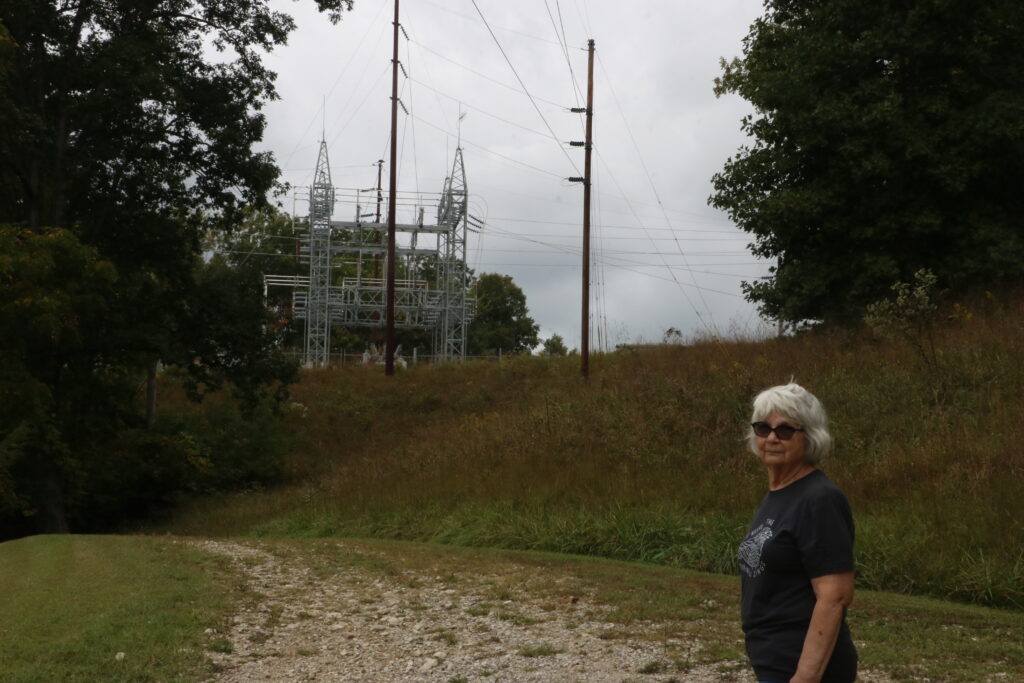 Campbell can see the substation powering Artemis Power Tech’s facility from her home, with electrical wires crossing by her property. (Kentucky Lantern photo by Liam Niemeyer)
Campbell can see the substation powering Artemis Power Tech’s facility from her home, with electrical wires crossing by her property. (Kentucky Lantern photo by Liam Niemeyer)
Artemis Power Tech doesn’t explicitly say what it’s using the Wolfe County data center for, though a recent job listing for the company does provide hints.
On an online forum post translated to English from Chinese through Google Translate, a job listing dated Sept. 19 describes Artemis Power Tech as “a leading blockchain technology company focusing on the mining farm construction industry” that’s seeking “mine operations engineers” for job sites in Oklahoma and Kentucky. On Artemis Power Tech’s website, the company showcases data centers in Oklahoma and the site in Wolfe County.
The job posting goes on to say specific job duties for the engineers include “maintaining and managing mining equipment” and “monitoring power supply and power consumption” at the sites.
The CEO and co-founder of Artemis Power Tech did not respond to requests for an interview about the noise complaints and why the company decided to set up an operation in Wolfe County.
The Wolfe County data center does use the enormous amounts of power typical of cryptocurrency mining operations. A power supply contract between East Kentucky Power Cooperative and Artemis Power Tech shows the utility supplying the data center with 10 megawatts of power. The company has the ability to increase that amount to 13 megawatts of power, equivalent to powering more than 5,000 homes over the course of a year.
John May is the manager of administrative services for the region’s electric distribution cooperative, Licking Valley RECC, which gets its power from East Kentucky Power Cooperative. May said the power demand of the new facility is unprecedented for the area; it uses vastly more electricity than its next largest consumer: a prison. May said Eastern Kentucky Correctional Complex in Morgan County only uses about one megawatt of electricity.
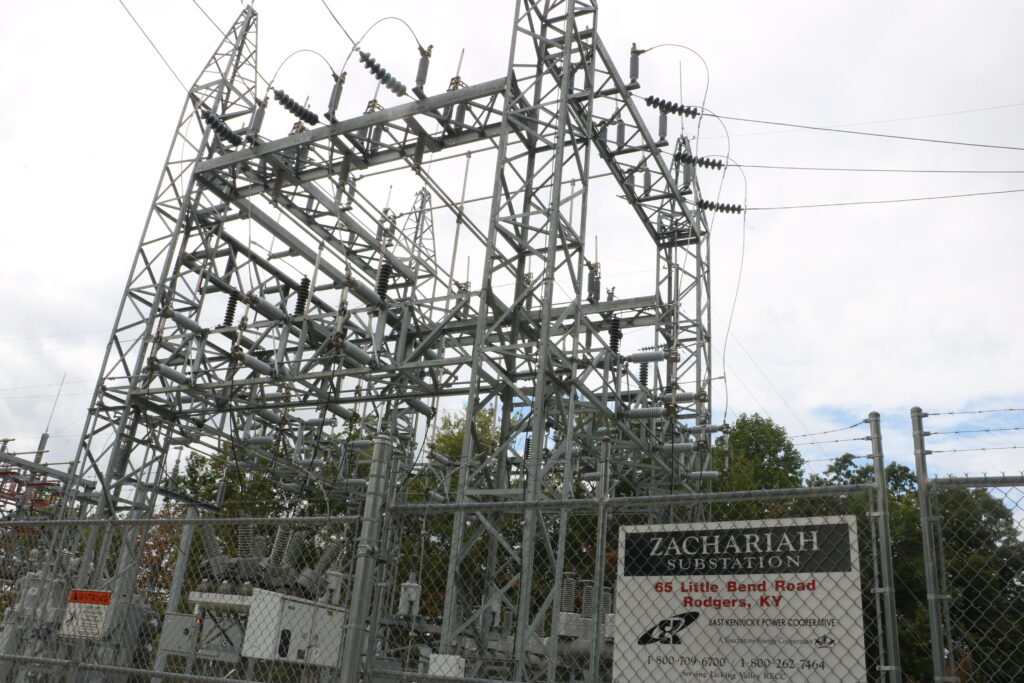 Artemis Power Tech paid East Kentucky Power Cooperative more than $200,000 to upgrade the electrical substation to meet the power demands of the operation. (Kentucky Lantern photo by Liam Niemeyer)
Artemis Power Tech paid East Kentucky Power Cooperative more than $200,000 to upgrade the electrical substation to meet the power demands of the operation. (Kentucky Lantern photo by Liam Niemeyer)
“We’re a very small rural co-op. We don’t really have any large industry,” May said. “I don’t know the specifics about what they’re mining. I just know it’s a mining facility. I don’t see what their servers are doing.”
May said he does empathize with Campbell and her family about the noise, but that Licking Valley RECC is required by Kentucky law to provide electricity to businesses on demand. He said the cooperative tried to work with Artemis Power Tech to limit the trees cut down at the site to buffer the noise.
He said while such cryptocurrency mining facilities don’t provide much in the way of jobs, the revenue from the operation could delay future rate increases by utility East Kentucky Power Cooperative.
“There’s plenty of businesses out there that make noise as well. So, it’s unfortunate, you know, for the people that live next to it, whatever it may be,” May said.
May’s argument about cryptocurrency mining’s impact on utility rates echoes other arguments made by cryptocurrency advocates who see the industry as an economic development boost, an industry that Kentucky lawmakers have also tried to embrace.
Economic development, but at what cost?
A number of cryptocurrency mining facilities have flocked to Kentucky in recent years driven by the need for available power — and importantly cheap power — to fuel their computers. Besides the cost of machines, the cost of electricity is generally the biggest expense for such companies.
The GOP-controlled Kentucky legislature and Kentucky’s Democratic governor have also sweetened the incentives for such companies to come to the state in the form of tax breaks. Some cryptocurrency mining companies have also received discounts on electricity costs from utilities including East Kentucky Power Cooperative in return for the perceived investment brought into communities.
 Brenda Campbell’s home sits down the hill from Artemis Power Tech’s new operation in Wolfe County. (Kentucky Lantern photo by Liam Niemeyer)
Brenda Campbell’s home sits down the hill from Artemis Power Tech’s new operation in Wolfe County. (Kentucky Lantern photo by Liam Niemeyer)
Yet environmental conservation and renewable energy advocacy groups have raised concerns about the use of these electricity discounts and whether they should be saved for businesses that create more jobs; cryptocurrency mining facilities often create only a few. Some of these electricity discounts have come under scrutiny by Kentucky’s utility regulator.
Groups in Kentucky, such as the Kentucky Resources Council and Kentuckians for the Commonwealth, also have concerns about the growing and significant greenhouse gas emissions associated with the cryptocurrency mining industry, particularly in Kentucky where the electricity grid still heavily relies on coal-fired power.
Monica Sturgill, a manager with the Ashland company Hay Crypto Mining that sold the Wolfe County land to Artemis Power Tech, recognizes that cryptocurrency mining operations don’t bring on a lot of new employees to a region.
She said the land sale was part of her company’s strategy to site cryptocurrency mining facilities next to substations in Eastern Kentucky that could handle the power load. Working as a consultant to locate crypto mining companies in the region, first off, would make money for her own company but also help East Kentucky Power Coopeartive’s ratepayers, reiterating May’s arguments about the facility’s benefits.
Environmental advocacy groups have argued cryptocurrency miners can instead harm utility consumers by pushing up rates. Researchers from the University of Chicago and the University of California, Berkley found that large power demands by cryptocurrency miners increased the cost of electricity for some communities in New York.
Sturgill said she was “shocked” to hear about the noise complaints in Wolfe County and that she had also dealt with noise complaints with another cryptocurrency mining operation she worked to locate in Elliott County.
“I wouldn’t say it’s quiet. It’s not quiet. You’re not going to not hear anything, right? But it is a different sound than what you’re used to,” Sturgill said, mentioning she would probably be annoyed by the sound if she was in the situation of nearby neighbors. “It would be different and it would be probably frustrating, but I wouldn’t say it’s like a nuisance.”
As for the possibility of a noise ordinance by the county government, she suggested such a move could make a cryptocurrency mining operation leave a community altogether if it’s not able to operate in the way it prefers.
“Everybody screams they want economic development, right? Everybody screams, ‘Our county has nothing, and we need something,’” Sturgill said. “When something is done properly and done correctly and done well, no matter what, there’s always somebody that’s upset with you.”
A push to curb the noise
 Brenda Campbell has lived at her Wolfe County home since 1980, back when she says her community was much more quiet. (Kentucky Lantern photo by Liam Niemeyer)
Brenda Campbell has lived at her Wolfe County home since 1980, back when she says her community was much more quiet. (Kentucky Lantern photo by Liam Niemeyer)
Back in Wolfe County, Campbell has heard the arguments about economic development in favor of the facility, including from a member of the Licking Valley RECC board whom she knows.
Speaking about the state laws that have benefited cryptocurrency mining in recent years, she understands that the intent of such laws was to spur economic growth.
“But I don’t think that they took into consideration the impact that one of those facilities would have on the community,” Campbell said.
Campbell and her neighbors see few people working at the Artemis Power Tech site, primarily a security guard who watches the facility. In late September, a Ford sedan was parked at the entrance of the operation where metal parts, wooden pallets and other construction equipment lay strewn on the ground.
Campbell said she’s also angry at her utility for its role in bringing the facility to Wolfe County, particularly with how Artemis Power Tech is paying East Kentucky Power Cooperative $235,000 to upgrade the substation to meet the operation’s power demands.
May, the Licking Valley RECC manager, said Artemis Power Tech’s payment is solely going toward upgrading the substation. A spokesperson for East Kentucky Power Cooperative in a statement said the utility generally creates a “special contract” with cryptocurrency mining operations because of their large power usage to make sure costs from the facility aren’t borne by other ratepayers.
Regardless of any perceived economic benefit, Campbell is continuing to push her county judge-executive and county magistrates to pass a noise ordinance that would keep the sound levels created by the Artemis Power Tech facility under a certain limit.
Billy Banks, the Wolfe County magistrate who represents Campbell’s part of the county, told the Lantern the county probably needs to pass a noise ordinance “sometime down the road.” He mentioned that Wolfe County Judge-Executive Raymond Banks, who Campbell has spoken with, had been at the site a few times and “didn’t see no problem with it.”
“I know Brenda personally. They’re good people, and I don’t want them to go through that,” magistrate Billy Banks said.
Raymond Banks, the judge-executive, has not responded to several calls and emails requesting an interview about the possibility of a noise ordinance.
Mandy DeRoche, a deputy managing attorney at the nonprofit environmental law firm Earthjustice, has followed similar noise complaints about other cryptocurrency mining operations in rural communities. The effort to get a noise ordinance in Wolfe County, she said, is no different.
“Noise is a hyper-locally regulated thing, right? That’s why a lot of places, especially in rural communities, don’t have zoning. They’re usually quiet,” DeRoche said. “A lot of our partners around the country have had to fight for protection to minimize the nuisance or eliminate the nuisance to the extent that they can.”
DeRoche said in states such as Arkansas and Montana, state legislatures have passed laws limiting local governments’ ability to pass noise ordinances directed by cryptocurrency mining facilities.
“It takes the right away from local communities to protect themselves from that noise,” DeRoche said.
Campbell has also reached out for help to state Sen. Brandon Smith, R-Hazard, who represents Wolfe County and is a strong advocate for cryptocurrency mining, but hasn’t heard back from him. A spokesperson for Smith said the senator, who’s the CEO and President of a Letcher County-based Bitcoin mining company, wasn’t immediately available for an interview and that the senator wanted to learn more about the situation in Wolfe County.
For her part, Campbell plans to continue to advocate for a noise ordinance not only for herself but for her extended family: her daughter and grandson who live across the street, the cousins who live down the road, the family that will inherit the home she lives in now.
“I’m 76. I’m not going to be around forever. So, a child that might inherit it, they’re going to have to, you know — they may want or not want to live here, so that’s something they would have to contend with,” she said.
“They’re not going to run me off,” she said.
 An Eastern Kentucky road that heads to Artemis Power Tech’s new facility in Wolfe County. (Kentucky Lantern photo by Liam Niemeyer)
An Eastern Kentucky road that heads to Artemis Power Tech’s new facility in Wolfe County. (Kentucky Lantern photo by Liam Niemeyer)
Tech
Harvard Alumni, Tech Moguls, and Best-Selling Authors Drive Nearly $600 Million in Pre-Order Sales
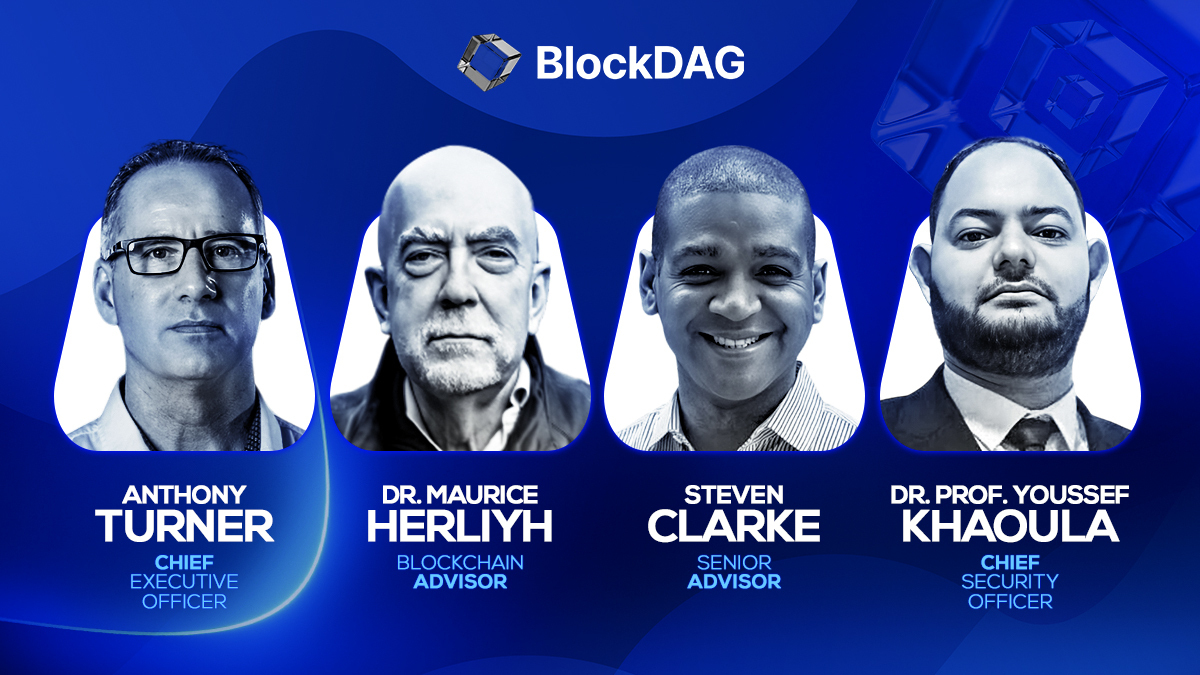
BlockDAG Network’s history is one of innovation, perseverance, and a vision to push the boundaries of blockchain technology. With Harvard alumni, tech moguls, and best-selling authors at the helm, BlockDAG is rewriting the rules of the cryptocurrency game.
CEO Antony Turner, inspired by the successes and shortcomings of Bitcoin and Ethereum, says, “BlockDAG leverages existing technology to push the boundaries of speed, security, and decentralization.” This powerhouse team has led a staggering 1,600% price increase in 20 pre-sale rounds, raising over $63.9 million. The secret? Unparalleled expertise and a bold vision for the future of blockchain.
Let’s dive into BlockDAG’s success story and find out what the future holds for this cryptocurrency.
The Origin: Why BlockDAG Was Created
In a recent interview, BlockDAG CEO Antony Turner perfectly summed up why the market needs BlockDAG’s ongoing revolution. He said:
“The creation of BlockDAG was inspired by Bitcoin and Ethereum, their successes and their shortcomings.
If you look at almost any new technology, it is very rare that the first movers remain at the forefront forever. Later incumbents have a huge advantage in entering a market where the need has been established and the technology is no longer cutting edge.
BlockDAG has done just that: our innovation is incorporating existing technology to provide a better solution, allowing us to push the boundaries of speed, security, and decentralization.”
The Present: How Far Has BlockDAG Come?
BlockDAG’s presale is setting new benchmarks in the cryptocurrency investment landscape. With a stunning 1600% price increase over 20 presale lots, it has already raised over $63.9 million in capital, having sold over 12.43 billion BDAG coins.
This impressive performance underscores the overwhelming confidence of investors in BlockDAG’s vision and leadership. The presale attracted over 20,000 individual investors, with the BlockDAG community growing exponentially by the hour.

These monumental milestones have been achieved thanks to the unparalleled skills, experience and expertise of BlockDAG’s management team:
Antony Turner – Chief Executive Officer
Antony Turner, CEO of BlockDAG, has over 20 years of experience in the Fintech, EdTech, Travel and Crypto industries. He has held senior roles at SPIRIT Blockchain Capital and co-founded Axona-Analytics and SwissOne. Antony excels in financial modeling, business management and scaling growth companies, with expertise in trading, software, IoT, blockchain and cryptocurrency.
Director of Communications
Youssef Khaoulaj, CSO of BlockDAG, is a Smart Contract Auditor, Metaverse Expert, and Red Team Hacker. He ensures system security and disaster preparedness, and advises senior management on security issues.

advisory Committee
Steven Clarke-Martin, a technologist and consultant, excels in enterprise technology, startups, and blockchain, with a focus on DAOs and smart contracts. Maurice Herlihy, a Harvard and MIT graduate, is an award-winning computer scientist at Brown University, with experience in distributed computing and consulting roles, most notably at Algorand.
The Future: Becoming the Cryptocurrency with the Highest Market Cap in the World
Given its impressive track record and a team of geniuses working tirelessly behind the scenes, BlockDAG is quickly approaching the $600 million pre-sale milestone. This crypto powerhouse will soon enter the top 30 cryptocurrencies by market cap.
Currently trading at $0.017 per coin, BlockDAG is expected to hit $1 million in the coming months, with the potential to hit $30 per coin by 2030. Early investors have already enjoyed a 1600% ROI by batch 21, fueling a huge amount of excitement around BlockDAG’s presale. The platform is seeing significant whale buying, and demand is so high that batch 21 is almost sold out. The upcoming batch is expected to drive prices even higher.

Invest in BlockDAG Pre-Sale Now:
Pre-sale: https://purchase.blockdag.network
Website: https://blockdag.network
Telegram: https://t.me/blockDAGnetwork
Discord: Italian: https://discord.gg/Q7BxghMVyu
No spam, no lies, just insights. You can unsubscribe at any time.
Tech
How Karak’s Latest Tech Integration Could Make Data Breaches Obsolete

- Space and Time uses zero-knowledge proofs to ensure secure and tamper-proof data processing for smart contracts and enterprises.
- The integration facilitates faster development and deployment of Distributed Secure Services (DSS) on the Karak platform.
Karak, a platform known for its strong security capabilities, is enhancing its Distributed Secure Services (DSS) by integrating Space and Time as a zero-knowledge (ZK) coprocessor. This move is intended to strengthen trustless operations across its network, especially in slashing and rewards mechanisms.
Space and Time is a verifiable processing layer that uses zero-knowledge proofs to ensure that computations on decentralized data warehouses are secure and untampered with. This system enables smart contracts, large language models (LLMs), and enterprises to process data without integrity concerns.
The integration with Karak will enable the platform to use Proof of SQL, a new ZK-proof approach developed by Space and Time, to confirm that SQL query results are accurate and have not been tampered with.
One of the key features of this integration is the enhancement of DSS on Karak. DSS are decentralized services that use re-staked assets to secure the various operations they provide, from simple utilities to complex marketplaces. The addition of Space and Time technology enables faster development and deployment of these services, especially by simplifying slashing logic, which is critical to maintaining security and trust in decentralized networks.
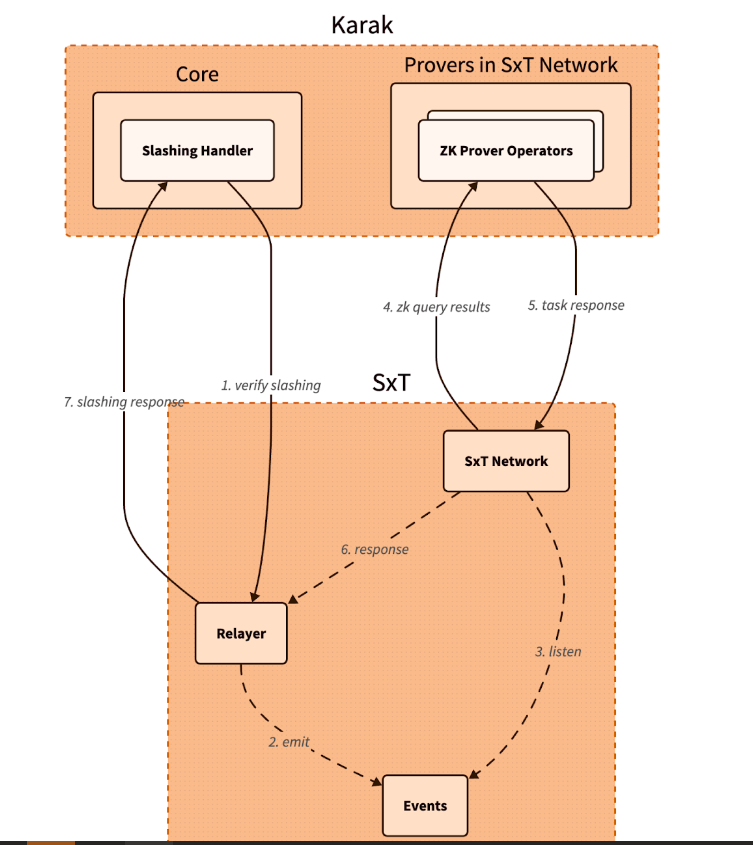
Additionally, Space and Time is developing its own DSS for blockchain data indexing. This service will allow community members to easily participate in the network by running indexing nodes. This is especially beneficial for applications that require high security and decentralization, such as decentralized data indexing.
The integration architecture follows a detailed and secure flow. When a Karak slashing contract needs to verify a SQL query, it calls the Space and Time relayer contract with the required SQL statement. This contract then emits an event with the query details, which is detected by operators in the Space and Time network.
These operators, responsible for indexing and monitoring DSS activities, validate the event and route the work to a verification operator who runs the query and generates the necessary ZK proof.
The result, along with a cryptographic commitment on the queried data, is sent to the relayer contract, which verifies and returns the data to the Karak cutter contract. This end-to-end process ensures that the data used in decision-making, such as determining penalties within the DSS, is accurate and reliable.
Karak’s mission is to provide universal security, but it also extends the capabilities of Space and Time to support multiple DSSs with their data indexing needs. As these technologies evolve, they are set to redefine the secure, decentralized computing landscape, making it more accessible and efficient for developers and enterprises alike. This integration represents a significant step towards a more secure and verifiable digital infrastructure in the blockchain space.
Website | X (Twitter) | Discord | Telegram
No spam, no lies, just insights. You can unsubscribe at any time.
Tech
Cryptocurrency Payments: Should CFOs Consider This Ferrari-Approved Trend?

Iconic Italian luxury carmaker Ferrari has announced the expansion of its cryptocurrency payment system to its European dealer network.
The move, which follows a successful launch in North America less than a year ago, raises a crucial question for CFOs across industries: Is it time to consider accepting cryptocurrency as a form of payment for your business?
Ferrari’s move isn’t an isolated one. It’s part of a broader trend of companies embracing digital assets. As of 2024, we’re seeing a growing number of companies, from tech giants to traditional retailers, accepting cryptocurrencies.
This change is determined by several factors:
- Growing mainstream adoption of cryptocurrencies
- Growing demand from tech-savvy and affluent consumers
- Potential for faster and cheaper international transactions
- Desire to project an innovative brand image
Ferrari’s approach is particularly noteworthy. They have partnered with BitPay, a leading cryptocurrency payment processor, to allow customers to purchase vehicles using Bitcoin, Ethereum, and USDC. This satisfies their tech-savvy and affluent customer base, many of whom have large digital asset holdings.
Navigating Opportunities and Challenges
Ferrari’s adoption of cryptocurrency payments illustrates several key opportunities for companies considering this move. First, it opens the door to new customer segments. By accepting cryptocurrency, Ferrari is targeting a younger, tech-savvy demographic—people who have embraced digital assets and see them as a legitimate form of value exchange. This strategy allows the company to connect with a new generation of affluent customers who may prefer to conduct high-value transactions in cryptocurrency.
Second, cryptocurrency adoption increases global reach. International payments, which can be complex and time-consuming with traditional methods, become significantly easier with cryptocurrency transactions. This can be especially beneficial for businesses that operate in multiple countries or deal with international customers, as it potentially reduces friction in cross-border transactions.
Third, accepting cryptocurrency positions a company as innovative and forward-thinking. In today’s fast-paced business environment, being seen as an early adopter of emerging technologies can significantly boost a brand’s image. Ferrari’s move sends a clear message that they are at the forefront of financial innovation, which can appeal to customers who value cutting-edge approaches.
Finally, there is the potential for cost savings. Traditional payment methods, especially for international transactions, often incur substantial fees. Cryptocurrency transactions, on the other hand, can offer lower transaction costs. For high-value purchases, such as luxury cars, these savings could be significant for both the business and the customer.
While the opportunities are enticing, accepting cryptocurrency payments also presents significant challenges that businesses must address. The most notable of these is volatility. Cryptocurrency values can fluctuate dramatically, sometimes within hours, posing potential risk to businesses that accept them as payment. Ferrari addressed this challenge by implementing a system that instantly converts cryptocurrency received into traditional fiat currencies, effectively mitigating the risk of value fluctuations.
Regulatory uncertainty is another major concern. The legal landscape surrounding cryptocurrencies is still evolving in many jurisdictions around the world. This lack of clear and consistent regulations can create compliance challenges for companies, especially those operating internationally. Companies must remain vigilant and adaptable as new laws and regulations emerge, which can be a resource-intensive process.
Implementation costs are also a significant obstacle. Integrating cryptocurrency payment systems often requires substantial investment in new technology infrastructure and extensive staff training. This can be especially challenging for small businesses or those with limited IT resources. The costs are not just financial; a significant investment of time is also required to ensure smooth implementation and operation.
Finally, security concerns loom large in the world of cryptocurrency transactions. While blockchain technology offers some security benefits, cryptocurrency transactions still require robust cybersecurity measures to protect against fraud, hacks, and other malicious activity. Businesses must invest in robust security protocols and stay up-to-date on the latest threats and protections, adding another layer of complexity and potential costs to accepting cryptocurrency payments.
Strategic Considerations for CFOs
If you’re thinking of following in Ferrari’s footsteps, here are the key factors to consider:
- Risk Assessment: Carefully evaluate potential risks to your business, including financial, regulatory, and reputational risks.
- Market Analysis: Evaluate whether your customer base is significantly interested in using cryptocurrencies for payments.
- Technology Infrastructure: Determine the costs and complexities of implementing a cryptographic payment system that integrates with existing financial processes.
- Regulatory Compliance: Ensure that cryptocurrency acceptance is in line with local regulations in all markets you operate in. Ferrari’s gradual rollout demonstrates the importance of this consideration.
- Financial Impact: Analyze how accepting cryptocurrency could impact your cash flow, accounting practices, and financial reporting.
- Partnership Evaluation: Consider partnering with established crypto payment processors to reduce risk and simplify implementation.
- Employee Training: Plan comprehensive training to ensure your team is equipped to handle cryptocurrency transactions and answer customer questions.
While Ferrari’s adoption of cryptocurrency payments is exciting, it’s important to consider this trend carefully.
A CFO’s decision to adopt cryptocurrency as a means of payment should be based on a thorough analysis of your company’s specific needs, risk tolerance, and strategic goals. Cryptocurrency payments may not be right for every business, but for some, they could provide a competitive advantage in an increasingly digital marketplace.
Remember that the landscape is rapidly evolving. Stay informed about regulatory changes, technological advancements, and changing consumer preferences. Whether you decide to accelerate your crypto engines now or wait in the pit, keeping this payment option on your radar is critical to navigating the future of business transactions.
Was this article helpful?
Yes No
Sign up to receive your daily business insights
Tech
Bitcoin Tumbles as Crypto Market Selloff Mirrors Tech Stocks’ Plunge
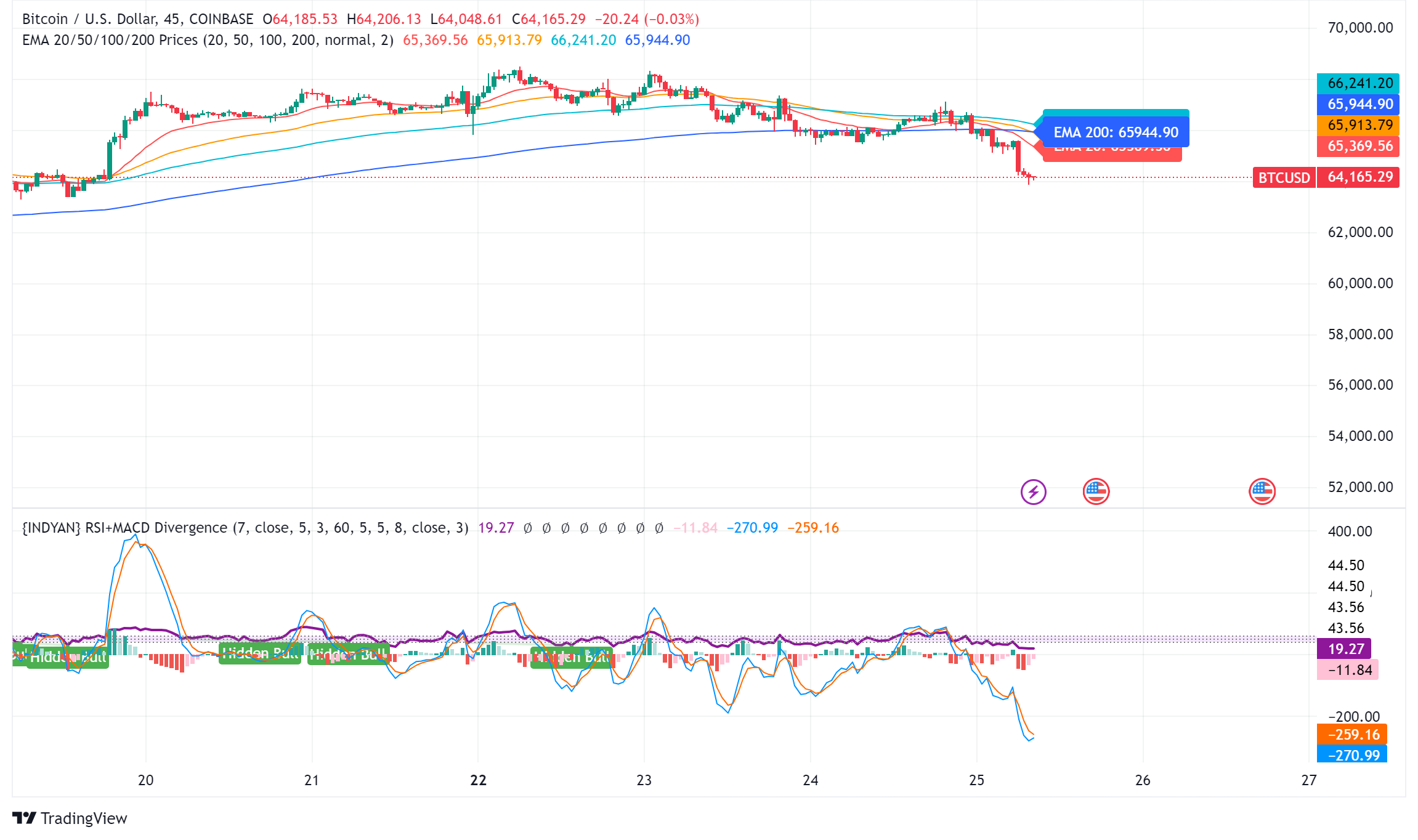
The world’s largest cryptocurrency, Bitcoin (BTC), suffered a significant price decline on Wednesday, falling below $65,000. The decline coincides with a broader market sell-off that has hit technology stocks hard.
Cryptocurrency Liquidations Hit Hard
CoinGlass data reveals a surge in long liquidations in the cryptocurrency market over the past 24 hours. These liquidations, totaling $220.7 million, represent forced selling of positions that had bet on price increases. Bitcoin itself accounted for $14.8 million in long liquidations.
Ethereum leads the decline
Ethereal (ETH), the second-largest cryptocurrency, has seen a steeper decline than Bitcoin, falling nearly 8% to trade around $3,177. This decline mirrors Bitcoin’s price action, suggesting a broader market correction.
Cryptocurrency market crash mirrors tech sector crash
The cryptocurrency market decline appears to be linked to the significant losses seen in the U.S. stock market on Wednesday. Stock market listing The index, heavily weighted toward technology stocks, posted its sharpest decline since October 2022, falling 3.65%.
Analysts cite multiple factors
Several factors may have contributed to the cryptocurrency market crash:
- Tech earnings are underwhelming: Earnings reports from tech giants like Alphabet are disappointing (Google(the parent company of), on Tuesday, triggered a sell-off in technology stocks with higher-than-expected capital expenditures that could have repercussions on the cryptocurrency market.
- Changing Political Landscape: The potential impact of the upcoming US elections and changes in Washington’s policy stance towards cryptocurrencies could influence investor sentiment.
- Ethereal ETF Hopes on the line: While bullish sentiment around a potential U.S. Ethereum ETF initially boosted the market, delays or rejections could dampen enthusiasm.
Analysts’ opinions differ
Despite the short-term losses, some analysts remain optimistic about Bitcoin’s long-term prospects. Singapore-based cryptocurrency trading firm QCP Capital believes Bitcoin could follow a similar trajectory to its post-ETF launch all-time high, with Ethereum potentially converging with its previous highs on sustained institutional interest.
Rich Dad Poor Dad Author’s Prediction
Robert Kiyosaki, author of the best-selling Rich Dad Poor Dad, predicts a potential surge in the price of Bitcoin if Donald Trump is re-elected as US president. He predicts a surge to $105,000 per coin by August 2025, fueled by a weaker dollar that is set to boost US exports.
BTC/USD Technical Outlook
Bitcoin price is currently trading below key support levels, including the $65,500 level and the 100 hourly moving average. A break below the $64,000 level could lead to further declines towards the $63,200 support zone. However, a recovery above the $65,500 level could trigger another increase in the coming sessions.
-

 News11 months ago
News11 months agoVolta Finance Limited – Director/PDMR Shareholding
-

 News11 months ago
News11 months agoModiv Industrial to release Q2 2024 financial results on August 6
-

 News11 months ago
News11 months agoApple to report third-quarter earnings as Wall Street eyes China sales
-

 News11 months ago
News11 months agoNumber of Americans filing for unemployment benefits hits highest level in a year
-

 News1 year ago
News1 year agoInventiva reports 2024 First Quarter Financial Information¹ and provides a corporate update
-

 News1 year ago
News1 year agoLeeds hospitals trust says finances are “critical” amid £110m deficit
-

 DeFi1 year ago
DeFi1 year ago🏴☠️ Pump.Fun operated by Insider Exploit
-

 Markets1 year ago
Markets1 year agoWhale Investments in Bitcoin Hit $100 Billion in 2024, Fueling Insane Investor Optimism ⋆ ZyCrypto
-

 Tech1 year ago
Tech1 year agoBitcoin’s Correlation With Tech Stocks Is At Its Highest Since August 2023: Bloomberg ⋆ ZyCrypto
-

 Tech1 year ago
Tech1 year agoEverything you need to know
-

 News11 months ago
News11 months agoStocks wobble as Fed delivers and Meta bounces
-

 Markets1 year ago
Markets1 year agoCrazy $3 Trillion XRP Market Cap Course Charted as Ripple CEO Calls XRP ETF “Inevitable” ⋆ ZyCrypto





